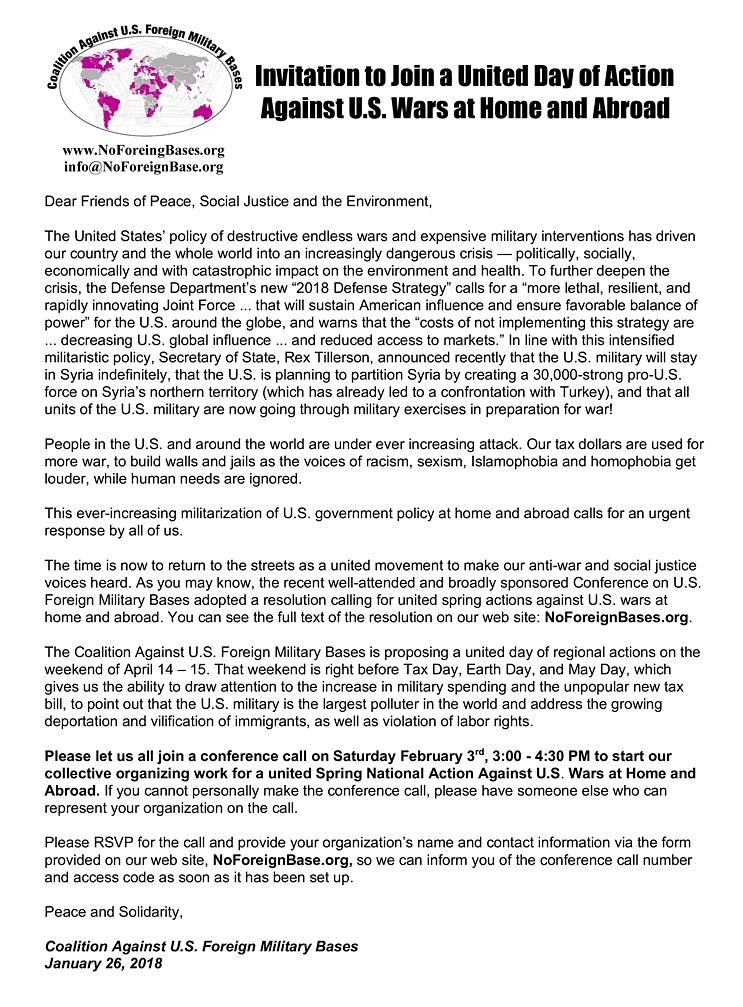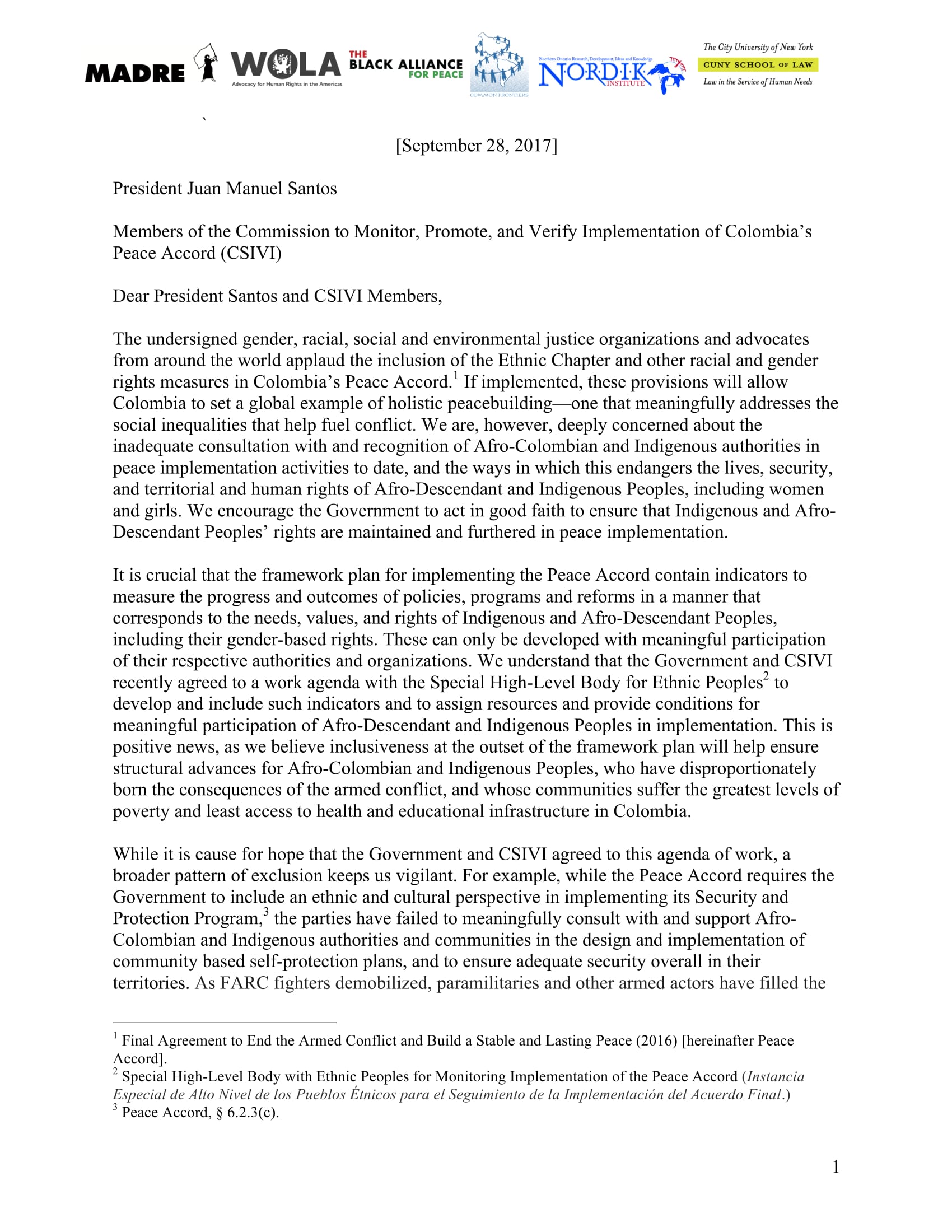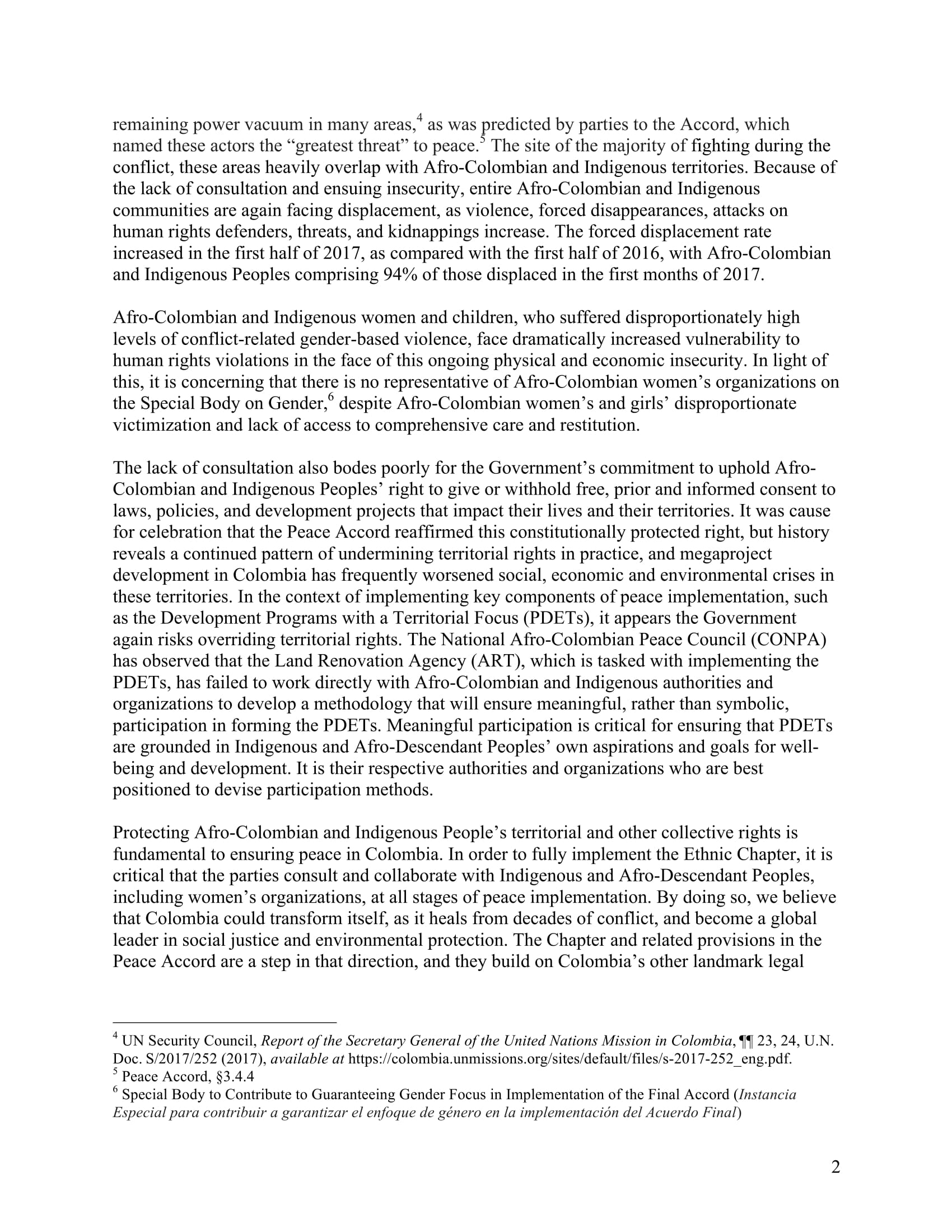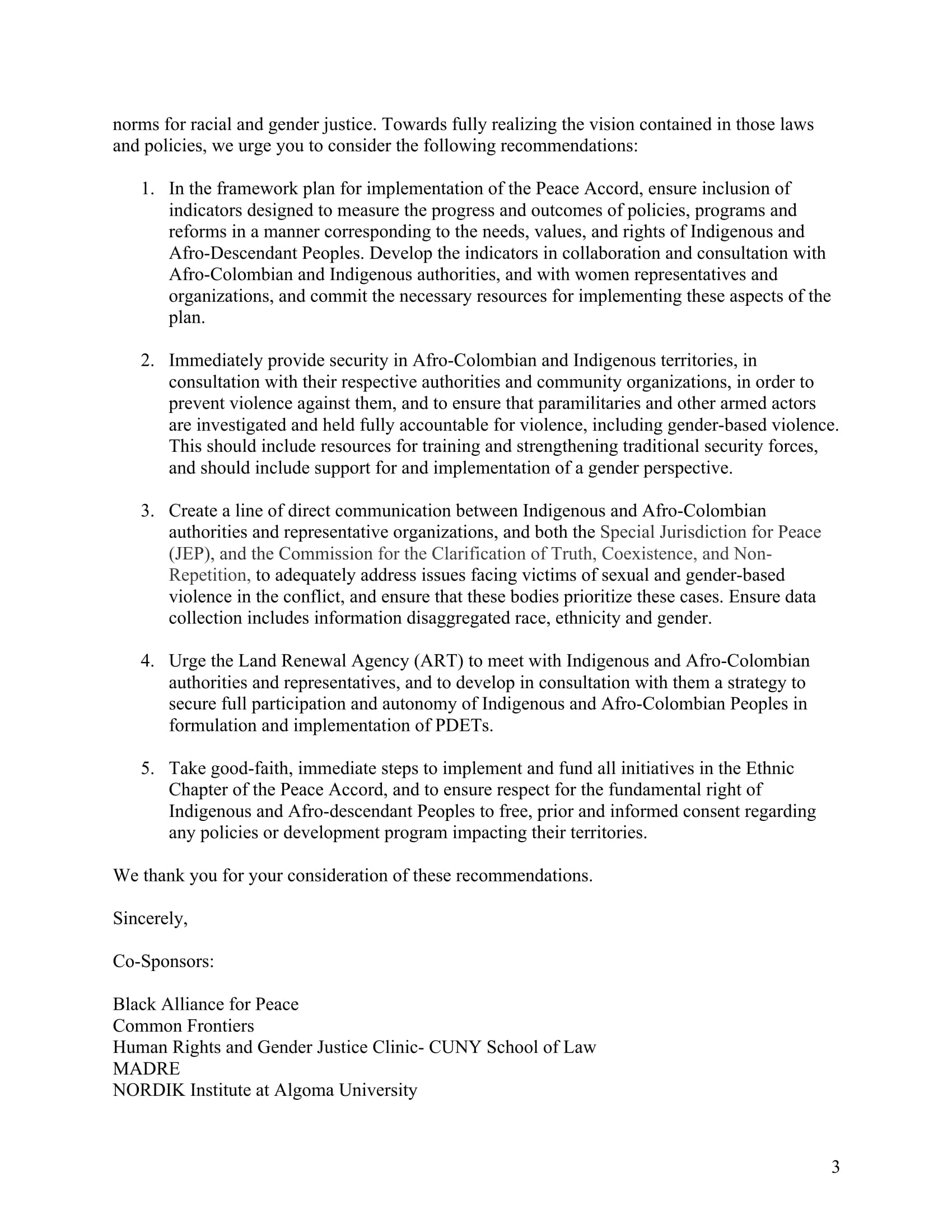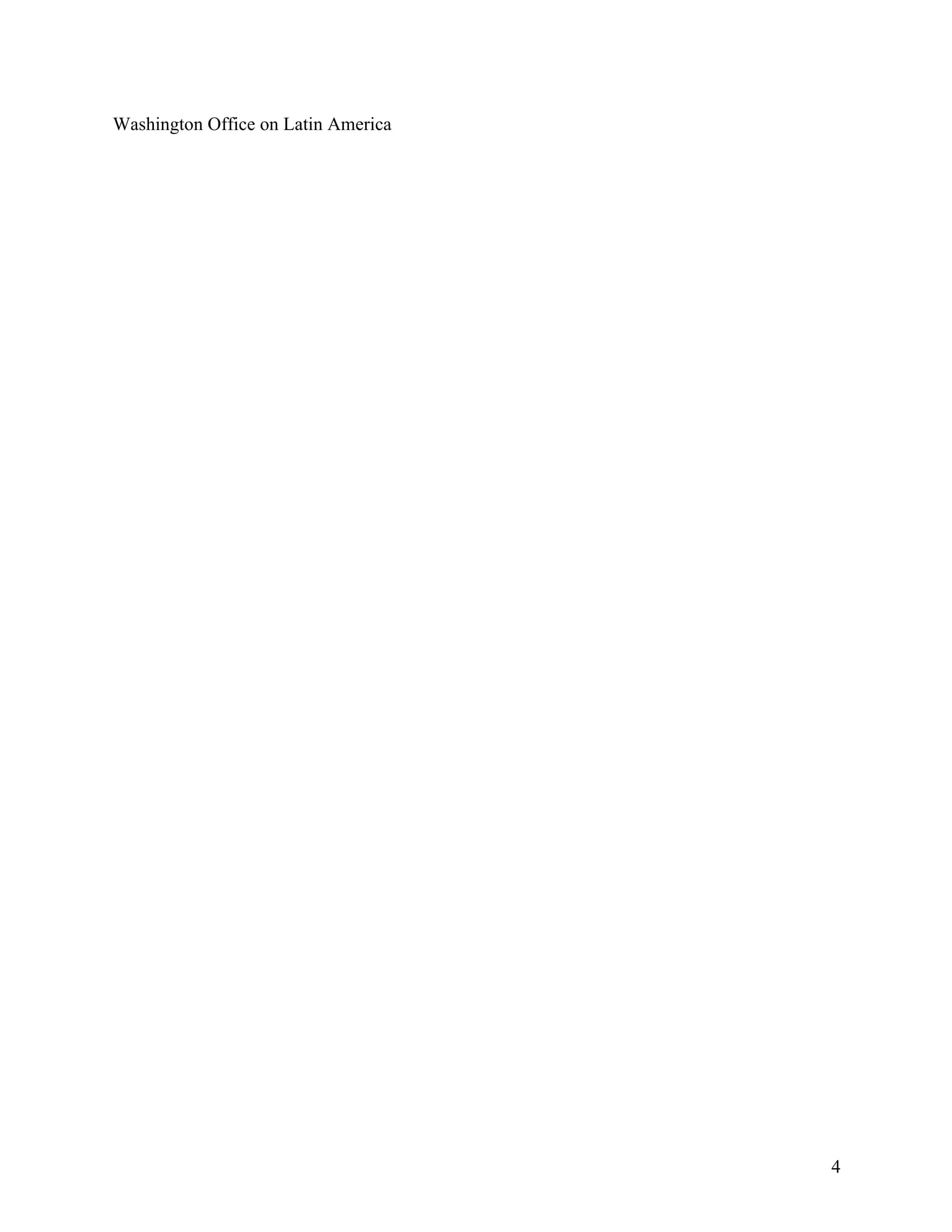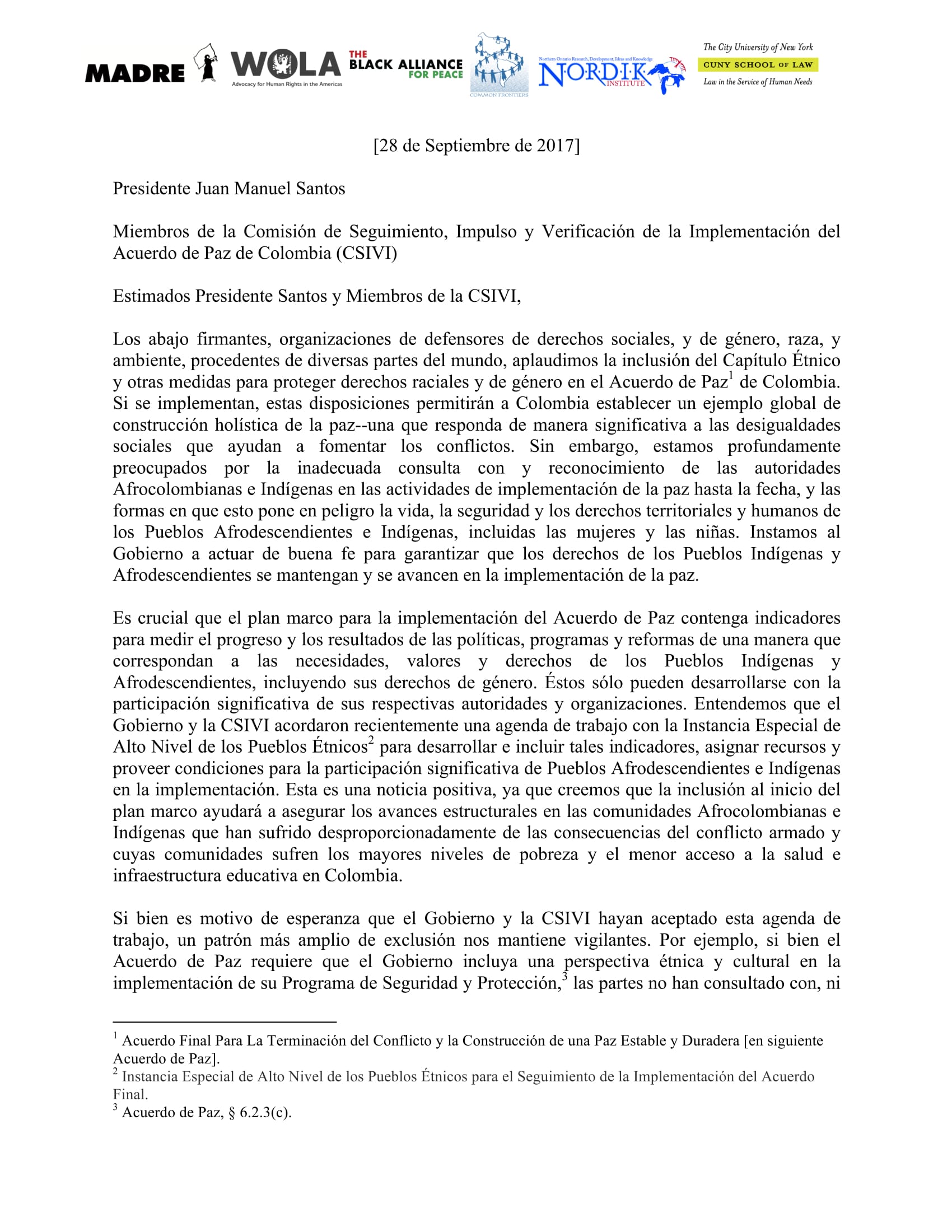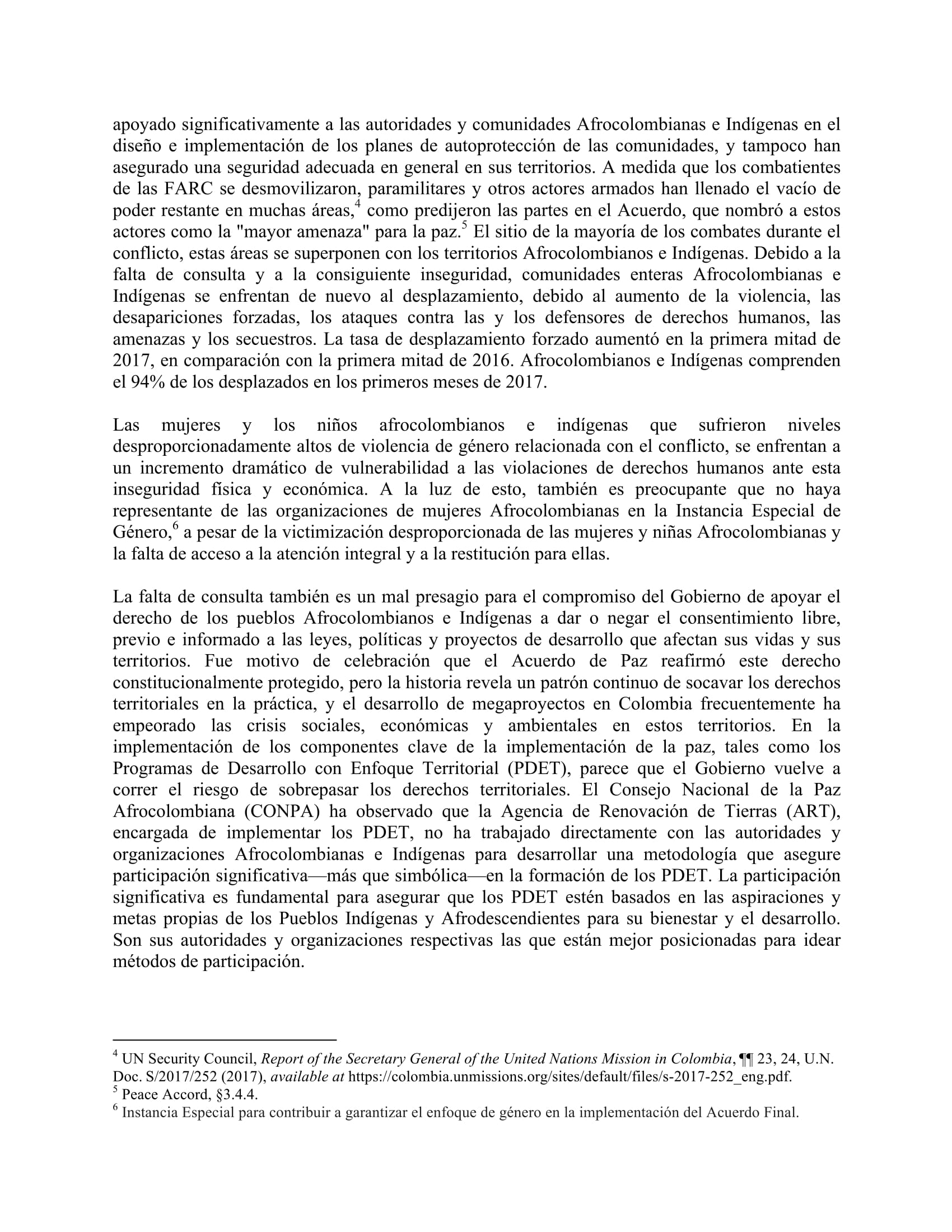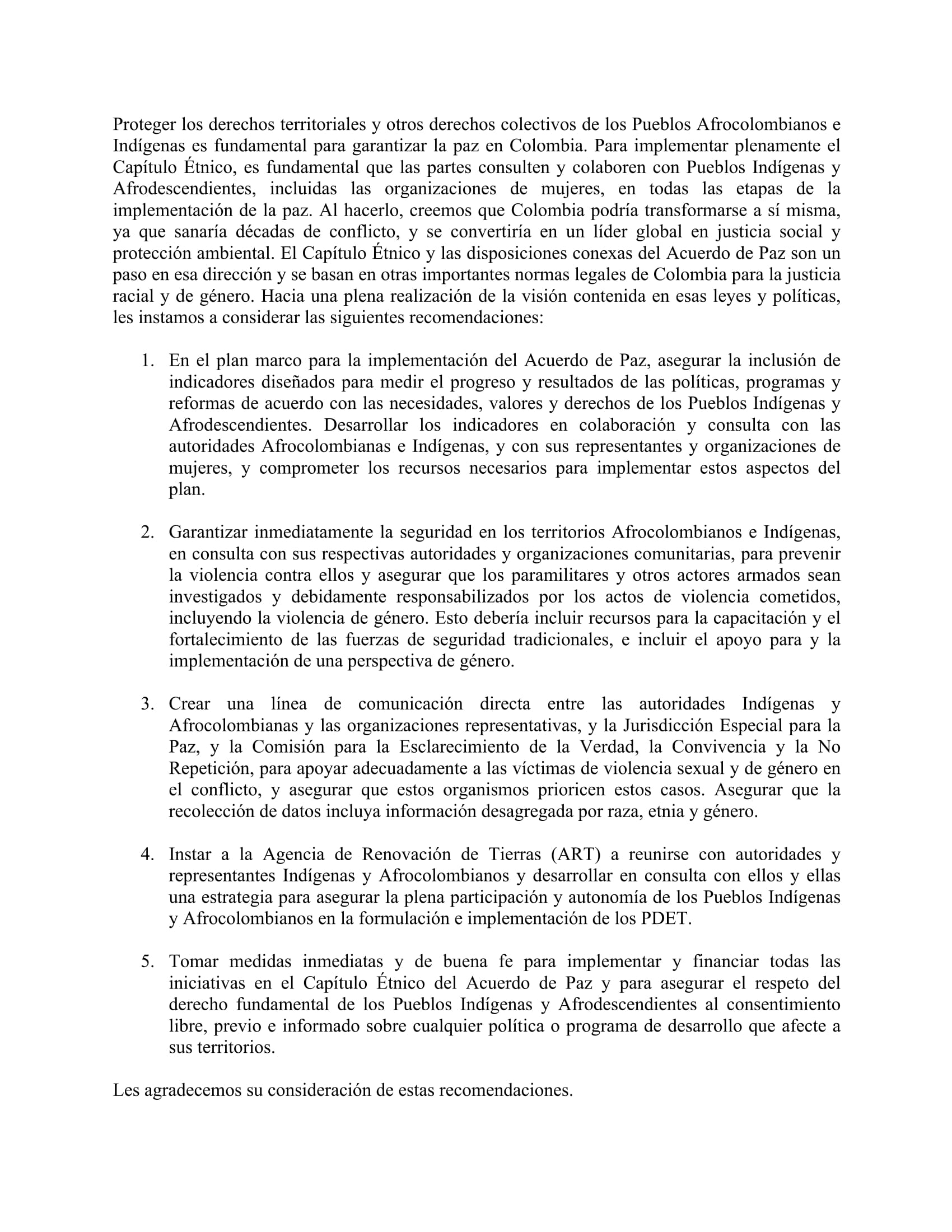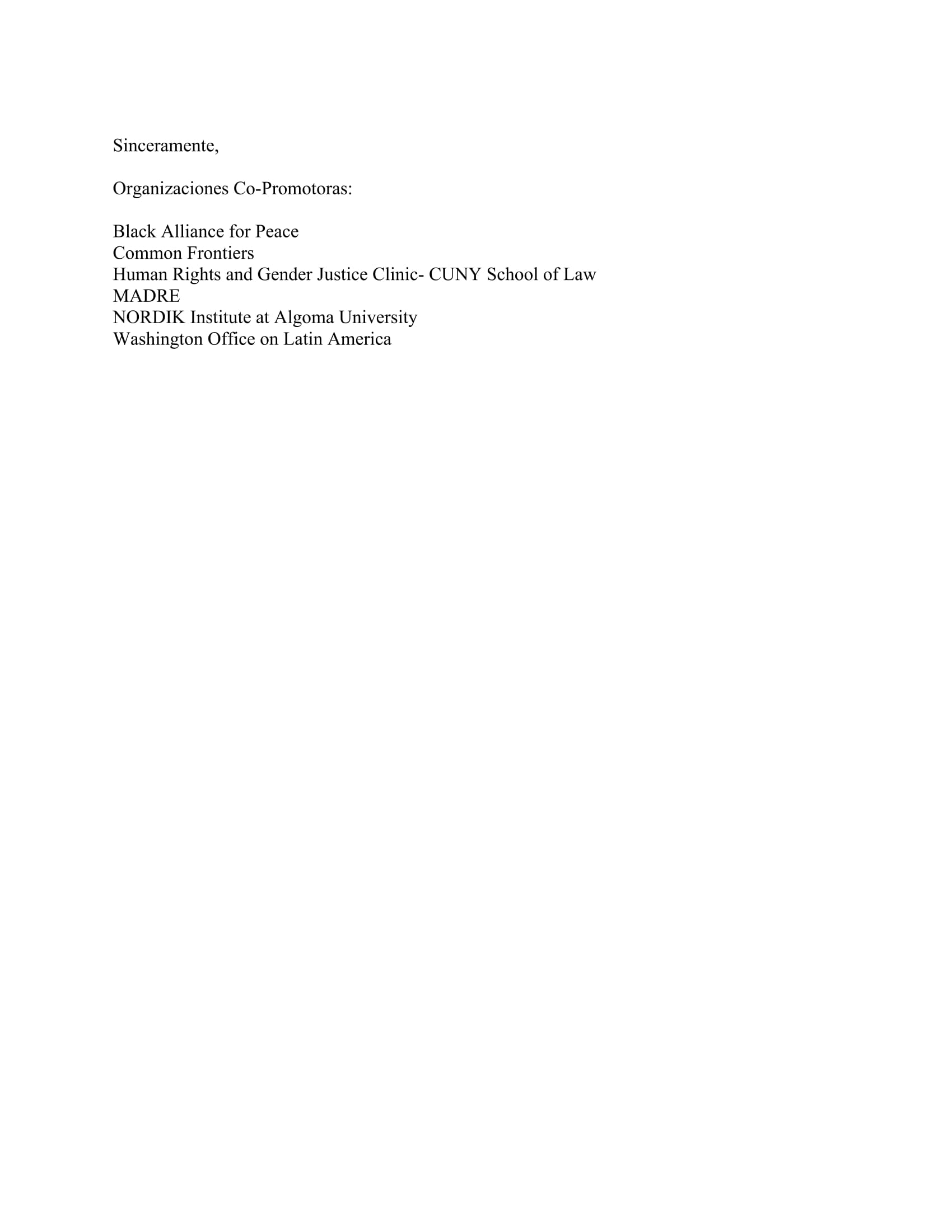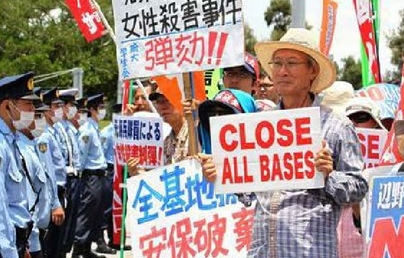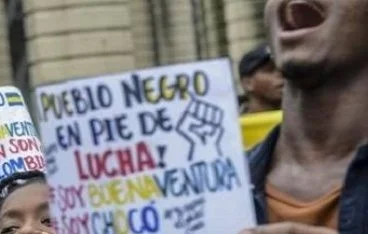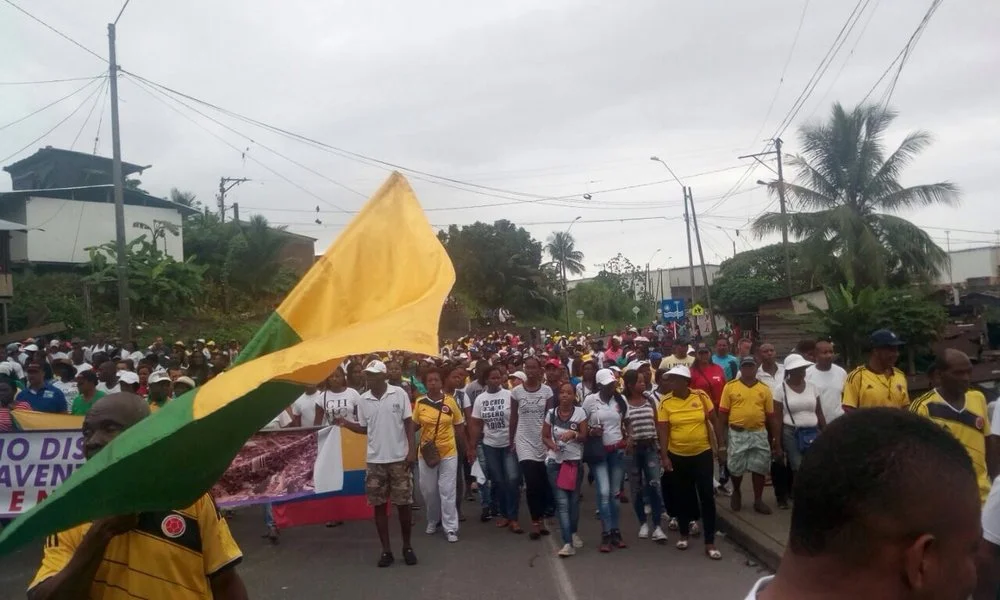Peace Process at a Critical Juncture; Began After 22-Day Strike Preventing Millions of Dollars in Exports from Entering Country
Below you will find a letter the Black Alliance for Peace (BAP) signed onto. Many of our comrades—from Chris Hedges and Cornel West to CODEPINK and Pan-African Community Action—also have stepped up to demand Colombian President Juan Manuel Santos give in to the demands of Afro-Colombians and Indigenous peoples.
PDF of letter in Spanish and English
---
To President Juan Manuel Santos and Members of the Commission to Monitor, Promote, and Verify Implementation of Colombia’s Peace Accord (CSIVI)
Dear President Santos and CSIVI Members,
The undersigned gender, racial, social and environmental justice organizations and advocates from around the world applaud the inclusion of the Ethnic Chapter and other racial and gender rights measures in Colombia’s Final Agreement to End the Armed Conflict and Build a Stable and Lasting Peace. If implemented, these provisions will allow Colombia to set a global example of holistic peacebuilding—one that meaningfully addresses the social inequalities that help fuel conflict. We are, however, deeply concerned about the inadequate consultation with and recognition of Afro-Colombian and Indigenous authorities in peace implementation activities to date, and the ways in which this endangers the lives, security, and territorial and human rights of Afro-Descendant and Indigenous Peoples, including women and girls. We encourage the Government to act in good faith to ensure that Indigenous and Afro-Descendant Peoples’ rights are maintained and furthered in peace implementation.
It is crucial that the framework plan for implementing the Peace Accord contain indicators to measure the progress and outcomes of policies, programs and reforms in a manner that corresponds to the needs, values, and rights of Indigenous and Afro-Descendant Peoples, including their gender-based rights. These can only be developed with meaningful participation of their respective authorities and organizations. We understand that the Government and CSIVI recently agreed to a work agenda with the Special High-Level Body with Ethnic Peoples for Monitoring Implementation of the Peace Accords to develop and include such indicators and to assign resources and provide conditions for meaningful participation of Afro-Descendant and Indigenous Peoples in implementation. This is positive news, as we believe inclusiveness at the outset of the framework plan will help ensure structural advances for Afro-Colombian and Indigenous Peoples, who have disproportionately born the consequences of the armed conflict, and whose communities suffer the greatest levels of poverty and least access to health and educational infrastructure in Colombia.
While it is cause for hope that the Government and CSIVI agreed to this agenda of work, a broader pattern of exclusion keeps us vigilant. For example, while the Peace Accord requires the Government to include an ethnic and cultural perspective in implementing its Security and Protection Program, the parties have failed to meaningfully consult with and support Afro-Colombian and Indigenous authorities and communities in the design and implementation of community based self-protection plans, and to ensure adequate security overall in their territories. As FARC fighters demobilized, paramilitaries and other armed actors have filled the remaining power vacuum in many areas, as was predicted by parties to the Accord, which named these actors the “greatest threat” to peace.
The site of the majority of fighting during the conflict, these areas heavily overlap with Afro-Colombian and Indigenous territories. Because of the lack of consultation and ensuing insecurity, entire Afro-Colombian and Indigenous communities are again facing displacement, as violence, forced disappearances, attacks on human rights defenders, threats, and kidnappings increase. The forced displacement rate increased in the first half of 2017, as compared with the first half of 2016, with Afro-Colombian and Indigenous Peoples comprising 94% of those displaced in the first months of 2017.
Afro-Colombian and Indigenous women and children, who suffered disproportionately high levels of conflict-related gender-based violence, face dramatically increased vulnerability to human rights violations in the face of this ongoing physical and economic insecurity. In light of this, it is concerning that there is no representative of Afro-Colombian women’s organizations on the Special Body to Contribute to Guaranteeing Gender Focus in the Implementation of the Final Accord, despite Afro-Colombian women’s and girls’ disproportionate victimization and lack of access to comprehensive care and restitution.
The lack of consultation also bodes poorly for the Government’s commitment to uphold Afro-Colombian and Indigenous Peoples’ right to give or withhold free, prior and informed consent to laws, policies, and development projects that impact their lives and their territories. It was cause for celebration that the Peace Accord reaffirmed this constitutionally protected right, but history reveals a continued pattern of undermining territorial rights in practice, and megaproject development in Colombia has frequently worsened social, economic and environmental crises in these territories. In the context of implementing key components of peace implementation, such as the Development Programs with a Territorial Focus (PDETs), it appears the Government again risks overriding territorial rights. The National Afro-Colombian Peace Council (CONPA) has observed that the Land Renovation Agency (ART), which is tasked with implementing the PDETs, has failed to work directly with Afro-Colombian and Indigenous authorities and organizations to develop a methodology that will ensure meaningful, rather than symbolic, participation in forming the PDETs. Meaningful participation is critical for ensuring that PDETs are grounded in Indigenous and Afro-Descendant Peoples’ own aspirations and goals for well-being and development. It is their respective authorities and organizations who are best positioned to devise participation methods.
Protecting Afro-Colombian and Indigenous People’s territorial and other collective rights is fundamental to ensuring peace in Colombia. In order to fully implement the Ethnic Chapter, it is critical that the parties consult and collaborate with Indigenous and Afro-Descendant Peoples, including women’s organizations, at all stages of peace implementation. By doing so, we believe that Colombia could transform itself, as it heals from decades of conflict, and become a global leader in social justice and environmental protection. The Chapter and related provisions in the Peace Accord are a step in that direction, and they build on Colombia’s other landmark legal norms for racial and gender justice. Towards fully realizing the vision contained in those laws and policies, we urge you to consider the following recommendations:
-In the framework plan for implementation of the Peace Accord, ensure inclusion of indicators designed to measure the progress and outcomes of policies, programs and reforms in a manner corresponding to the needs, values, and rights of Indigenous and Afro-Descendant Peoples. Develop the indicators in collaboration and consultation with Afro-Colombian and Indigenous authorities, and with women representatives and organizations, and commit the necessary resources for implementing these aspects of the plan.
-Immediately provide security in Afro-Colombian and Indigenous territories, in consultation with their respective authorities and community organizations, in order to prevent violence against them, and to ensure that paramilitaries and other armed actors are investigated and held fully accountable for violence, including gender-based violence. This should include resources for training and strengthening traditional security forces, and should include support for and implementation of a gender perspective.
-Create a line of direct communication between Indigenous and Afro-Colombian authorities and representative organizations, and both the Special Jurisdiction for Peace (JEP), and the Commission for the Clarification of Truth, Coexistence, and Non-Repetition, to adequately address issues facing victims of sexual and gender-based violence in the conflict, and ensure that these bodies prioritize these cases. Ensure data collection includes information disaggregated race, ethnicity and gender.
-Urge the Land Renewal Agency (ART) to meet with Indigenous and Afro-Colombian authorities and representatives, and to develop in consultation with them a strategy to secure full participation and autonomy of Indigenous and Afro-Colombian Peoples in formulation and implementation of PDETs.
-Take good-faith, immediate steps to implement and fund all initiatives in the Ethnic Chapter of the Peace Accord, and to ensure respect for the fundamental right of Indigenous and Afro-descendant Peoples to free, prior and informed consent regarding any policies or development program impacting their territories.
We thank you for your consideration of these recommendations.
Sincerely,
Association for Women's Rights in Development (AWID), USA
Black Alliance for Peace, USA
Common Frontiers, Canada
Human Rights and Gender Justice Clinic- CUNY School of Law, USA
Just Associates (JASS), USA
MADRE, USA
NORDIK Institute at Algoma University, CANADA
Washington Office on Latin America, USA
African American Human Rights Foundation, USA
Africa World Now Project, USA
AFROAMERICAS Network
ask! - Arbeitsgruppe Schweiz-Kolumbien, Switzerland
The British Columbia Government and Service Employee’s Union, Canada
The Canadian Union of Postal Workers, Canada
Colombia Working Group, Canada
Center for Constitutional Rights, USA
Center for Women's Global Leadership, USA
Community Economic & Social Development Program at Algoma University, Canada
Coalición de Movimientos y Organizaciones Sociales y Populares de Colombia, Colombia
Coalition of Black Trade Unionists
CODEPINK, USA
Colectivo COPERA- Colectivo para eliminar el racismo en México, México
Colombia Action Solidarity Alliance (CASA), Canada
Corporación Colombia Visión Sur, Colombia
Corporación Mamuncia y Cacumen, Colombia
Defenders' Sacred Ground Historical Reclamation Project, USA
Desarrollo Económico y Social de los Mexicanos Indígenas, A.C., México
Dr. Keith Jennings, President, African American Human Rights Foundation
Economic and Social Development of Indigenous Mexicans, AC (DESMI, AC), Mexico
El Comite Noruego de Solidaridad con America Latina, Norway
Environmental Conflicts Observatory (OCA), Institute for Environmental Studies, National University of Colombia, Colombia
Feminist Alliance for Rights, USA
FOKUS-Forum for Women and Development, Norway
Fondo de Acción Urgente para América Latina y el Caribe (Urgent Action Fund Latin America and the Caribbean), Colombia
Freedom House, USA
Friends of the Congo, USA
Fondo de Acción Urgente para América Latina y el Caribe, Colombia
The Global Justice Center, USA
Green Party of the United States, USA
Grupo de Investigación Ciencia de la Información, Sociedad y Cultura, Pontificia Universidad la Javeriana, Pontificia Universidad la Javeriana, Colombia
Grupo de Investigación "Conflicto, región y sociedades rurales" de la Facultad de Estudios
Ambientales y Rurales, Colombia
Health and Human Rights Info, Norway
Human Rights Advocates, USA
Institute for Gender Research and Documentation, Sierra Leone
Institute of the Black World 21st Century, USA
Instituto de Bioética - Pontificia Universidad Javeriana, Colombia
International Institute on Race, Equality and Human Rights, USA
KolumbienKampgne, Germany
Latin America Working Group, USA
Latin American & Caribbean Solidarity Network (LACSN), Canada
LIMPAL Colombia, Colombia
M. Adams, Freedom Inc., USA
Mesa Ecuménica por la Paz, Colombia
The Mississippi Workers Center for Human Rights, USA
More Gardens Fund, USA
National Lawyers Guild, USA
Observatorio de Conflictos Ambientales, Universidad Nacional de Colombia, Colombia
Observatorio de Discriminación Racial, Colombia
Observatorio de Territorios Étnicos y Campesinos – Facultad de Estudios Ambientales y Rurales de la Universidad Javeriana, Colombia
Organización Living in English Corp - Autoridad Raizal, Colombia
OutRight Action International, USA
Pan-African Community Action
Pax Christi Medellin - Medellin PC, Colombia
Popular Resistance, USA
Rainforest Action Network, Lindsey Allen, Executive Director, USA
Red de Acción e Investigación Antiracista, Americas
Revival of Panafricanism Forum, USA
SAIH – El Fondo de Asistencia Internacional de los Estudiantes y Académicos noruegos, Norway
Santa Clara Law School - International Human Rights Clinic, USA
SHARE Foundation, El Salvador
Steelworkers Humanity Fund, Canada
StopImperialism.org, USA
Taller de Vida, Colombia
UN Action Against Sexual Violence in Conflict, USA
US Peace Council, USA
Virginia Defenders for Freedom, Justice & Equality, USA
West African Research & Innovation Management Association, Sierra Leone
Young Feminists Network, Nigeria
Ahmed Eltouny, Green Party US International Committee, USA
Aisha Fofana Ibrahim, Ph.D., University of Sierra Leone, Sierra Leone
Amanda Romero, Escuela Superior de Administración Pública (ESAP), Colombia
Ana Isabel Rodriguez Iglesias
Andrea Mérida Cuéllar
Angélica J. Afanador-Pujol, Ph.D., Arizona State University, USA
Arlene Eisen, USA
Arturo Escobar, University of North Carolina, Chapel Hill, USA
Bill Fletcher, Jr., USA
Blaine Bookey, USA
Brad Geyer, USA
Bruce Mannheim, Senior Professor of Anthropology, University of Michigan, USA
Carlos Agudelo, France
Carlos Andrés Baquero, Colombia
Carmen Anachury Diaz, Colombia
Caroline Yezer, Research Affiliate, Clark University, USA
Chris Hedges, Author and Human Rights Activist
Cornel West, USA
Daniel Kovalik, Associate General Counsel, United Steelworkers, AFL-CIO (USW), USA
Diana Isabel Guiza Gomez, Universidad Nacional de Colombia, Colombia
Divalizeth Murillo, Reporter, USA
Dr. Anthony Gronowicz, 2013 Green Party Candidate for Mayor of New York
Dr. Bronislaw Czarnocha, Hostos CC, City University of New York, USA
Dr. Francisco Dominguez, Middlesex University, United Kingdom
Dr. Pascha Bueno-Hansen, University of Delaware, USA
Dr. Rose Brewer, Black Alliance for Peace, USA
Dra. Rachel Sieder, CIESAS, D.F., México
Emidio "Mimi" Soltysik, Socialist Party Los Angeles Local, USA
Eva Kolodner, Regional Director East, Global Fund for Women, USA
Francisco Mora Villate, Colombia
Ginetta E.B. Candelario, Smith College, USA
Guillermo Alberto Padilla Rubiano, University of California, Berkeley, USA
Hector Lopez, Green Party, USA
Immanuel Ness, USA
Jaime Arocha, Grupo de Estudios Afrocolombianos, Universidad Nacional, Colombia
James Counts Early, Board of Institute for Policy Studies, USA
Jason Berteotti, Green Party of PA, USA
Jean E. Jackson, Massachusetts Institute of Technology, USA
Jonathan Fox, School of International Service, American University, USA
Joshua Frank, Managing Editor, CounterPunch
Kevin Zeese, Co-Director, Popular Resistance
Lucy Murphy, Art for People, USA
Lynn Stephen, University of Oregon, USA
M Adams, Freedom, Inc, USA
Marcus A. Johnson, City University of New York, Baruch, USA
Margaret Flowers, Co-Director, Popular Resistance
Margarita Huayhua, University of Massachusetts Dartmouth, USA
Margo Okazawa-Rey, Women for Genuine Security and International Women's Network against Militarism, USA
Margi Clarke, SHARE Foundation, El Salvador
Maria Cristina Guerrero, Corporacion Mandiyaco, Colombia
Mary O'Connor, University of California, Santa Barbara, USA
Mauricio Sanchez Alvarez, Universidad Autónoma del Estado de Morelos, México
Maylei Blackwell, University of California, Los Angeles, USA
Mayra Johana Tenjo, Rights and Resources, USA
Mesi Walton, Diaspora Dance, USA
Mneesha Gellman, Assistant Professor of Political Science, Emerson College, USA
Olutimehin Adegbeye, Young Feminists Network, Nigeria)
Paige Andrew, WE-Change Jamaica, Jamaica
Patricia Botero Gómez, Docente e investigadora de la Universidad de Manizales, Colombia
Peter Ranis, Professor Emeritus/ Political Science, City University of New York, USA
Prof. Concepción Martinez, Universidad Autónoma de Baja California, México
Ramiro S. Fúnez, USA
Robert Andolina, USA
Roosbelinda Cardenas, Hampshire College, USA
Amb. Shirley E. Barnes, U.S. Ambassador to Madagascar (Ret.), USA
Tanya Kateri Hernandez, Fordham University School of Law, USA
Tianna S. Paschel, University of California, Berkeley, USA
Virginie Laurent, Universidad de los Andes, Colombia
William Lucy, President Emeritus, Coalition of Black Trade Unionists
Yellen Aguilar-Ararat, P.C.N., Colombia
###
For more information:
Ajamu Baraka
National Organizer and Spokesperson
Black Alliance for Peace
info@blackallianceforpeace.com







